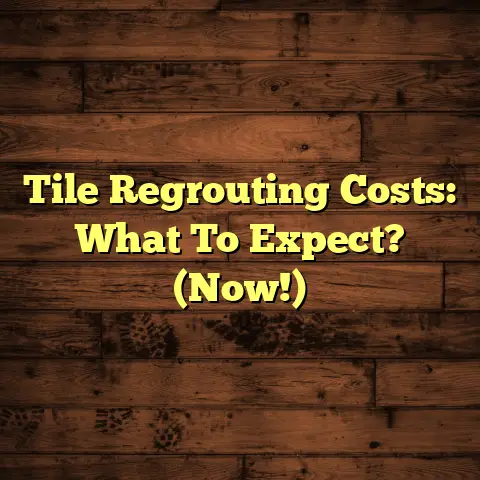How Much Does Epoxy Flooring Cost In India (Explained)
Epoxy flooring has gained popularity in India for its durability, aesthetic appeal, and low maintenance. However, many homeowners and business owners often wonder about the costs associated with installing epoxy flooring. This article provides a comprehensive overview of the cost factors involved, detailed price breakdowns, and comparisons with alternative flooring options.
Overview of Major Cost Factors
When estimating the cost of epoxy flooring installation, several key factors come into play:
1. Area Size
The total square footage of the area to be covered is one of the primary cost determinants. Larger areas will typically have a lower per-square-foot cost due to economies of scale.
2. Epoxy Type
There are various types of epoxy flooring, including self-leveling epoxies, epoxy mortar, and flake epoxy. Each type has different application methods and material costs.
3. Labor Costs
Labor costs can vary significantly based on location, the complexity of the job, and the experience of the installers.
4. Preparation Work
If the existing floor requires extensive preparation, such as removal of old flooring or repairs to the subfloor, this will increase overall costs.
5. Material Quality
Higher-grade epoxies and additives for slip resistance or aesthetic finishes will cost more than standard options.
6. Installation Complexity
Complex designs or multi-coloured applications will take more time and materials, thus increasing costs.
7. Geographical Location
Prices can vary by region in India due to differences in labor costs, availability of materials, and competition among contractors.
Detailed Cost Breakdown
Here’s a detailed breakdown of costs associated with epoxy flooring in India:
1. Material Costs
- Self-Leveling Epoxy: ₹100 to ₹250 per square foot
- Flake Epoxy: ₹150 to ₹300 per square foot
- Metallic Epoxy: ₹200 to ₹400 per square foot
- Epoxy Mortar: ₹200 to ₹350 per square foot
2. Labor Costs
Labor costs can range from ₹30 to ₹100 per square foot, depending on the complexity of the job.
3. Preparation Costs
- Floor Removal: ₹20 to ₹50 per square foot
- Subfloor Repair: ₹15 to ₹40 per square foot
- Surface Cleaning & Preparation: ₹10 to ₹30 per square foot
4. Total Cost Estimate
For a typical project size:
- Small Area (100-200 sq ft): ₹20,000 to ₹60,000
- Medium Area (500 sq ft): ₹70,000 to ₹1,50,000
- Large Area (1000 sq ft): ₹1,50,000 to ₹3,00,000
Comparison with Alternative Flooring Options
When considering epoxy flooring, it’s essential to compare it with other flooring options:
1. Laminate Flooring
- Cost: ₹40 to ₹80 per square foot
- Pros: Lower cost, easy installation
- Cons: Less durable than epoxy
2. Vinyl Flooring
- Cost: ₹50 to ₹150 per square foot
- Pros: Water-resistant, various designs
- Cons: Can wear out faster than epoxy
3. Carpet Flooring
- Cost: ₹30 to ₹100 per square foot
- Pros: Comfortable underfoot
- Cons: Difficult to maintain and clean compared to epoxy
Signs Your Epoxy Floors Need Replacement
While epoxy flooring is known for its durability, there are signs indicating that it may need replacement:
- Peeling or Bubbling: Indicates poor adhesion or moisture issues.
- Cracking: Can lead to further damage if not addressed.
- Discolouration: Excessive UV exposure can fade colours over time.
- Staining: Deep stains that cannot be cleaned may necessitate replacement.
Pros and Cons of Epoxy Flooring
Pros:
- Durability: Highly resistant to wear and tear.
- Low Maintenance: Easy to clean and maintain.
- Aesthetic Variety: Many design options available.
- Chemical Resistance: Suitable for industrial applications.
Cons:
- Installation Complexity: Requires skilled professionals for proper application.
- Temperature Sensitivity: Can be affected by extreme heat or cold during installation.
- Odour During Installation: Strong chemical smell that dissipates over time.
Professional Installation vs DIY
Professional Installation
- Cost: Higher upfront cost but ensures quality and longevity.
- Skills Required: Knowledge of proper techniques is crucial.
- Tools Needed: Specialized tools that may not be readily available.
DIY Installation
- Cost Savings: Can significantly reduce costs.
- Skill Level: Requires comfort with home improvement projects.
- Tools Needed: Basic tools might suffice but may require some rental equipment.
Questions to Ask Hardwood Flooring Contractors
When hiring a contractor for your epoxy flooring project, consider asking:
- What is your experience with epoxy flooring installations?
- Can you provide references from previous clients?
- What is included in your estimate?
- How do you handle unexpected issues during installation?
- What warranties do you offer on your work and materials?
Care and Maintenance Tips for Epoxy Floors
To maximize the longevity of your epoxy floors:
- Regular Cleaning: Sweep or vacuum regularly to remove debris.
- Mopping: Use a damp mop with a pH-neutral cleaner.
- Avoid Heavy Furniture: Use furniture pads to prevent scratches.
- Quickly Address Spills: Clean spills immediately to prevent staining.
- Periodic Inspections: Check for signs of damage or wear regularly.
Conclusion
Understanding the costs associated with epoxy flooring installation in India is vital for making an informed decision. With various factors influencing pricing and numerous options available, it’s essential to assess your specific needs and preferences carefully. Whether you opt for professional installation or decide to tackle it as a DIY project, ensure you choose the right materials and approach for long-lasting results. By weighing the pros and cons and considering alternative flooring options, you can select the best solution for your space, ensuring both functionality and aesthetic appeal.





